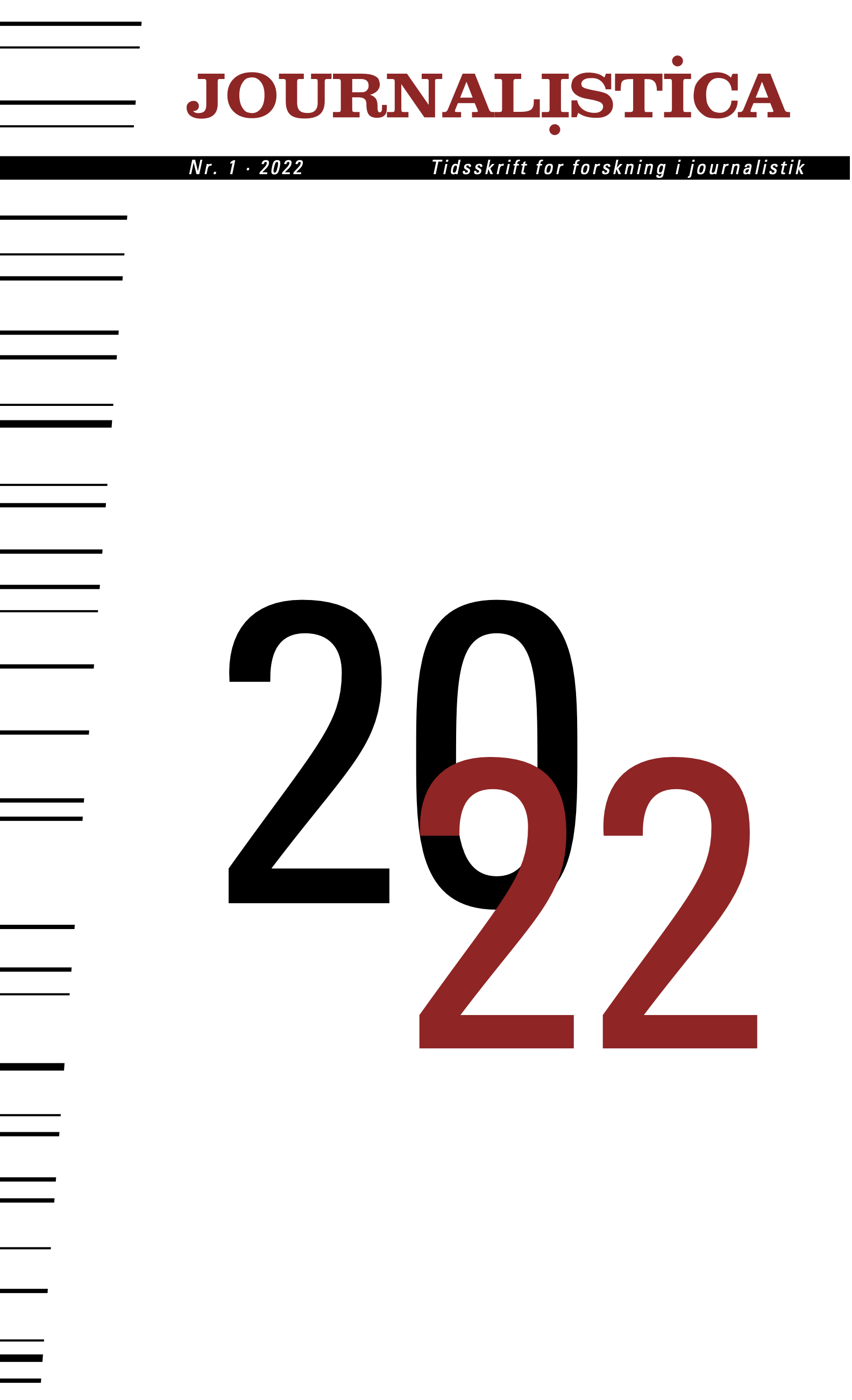Ekspertkilder i landsdækkende danske dagblade
Hvem er de, og hvilke roller og funktioner optræder de i?
DOI:
https://doi.org/10.7146/journalistica.v16i1.132421Keywords:
experts, sources, roles, trustworthiness, source criticismAbstract
Expert sources appear everywhere in the media and contribute to giving journalism authority and credibility. But the experts form a motley group and are used in very different roles and functions. There is a lack of current research-based knowledge about who they are and what they are used for. In this article, both of these aspects are examined. We carry out a content analysis of four weeks of coverage in 2021 in the three largest nationwide dailies in Denmark (Jyllands-Posten, Politiken and Berlingske Tidende) and compare the results with existing research. Almost half of the dailies' expert sources are privately employed non-researchers. Economists and other social studies graduates make up 79 percent of these. Among the research sources, women make up 22 percent. Women researchers from the natural sciences are particularly underrepresented. 86 percent of the research sources comment on current events and other people's research, while 14 percent comment on their own research. In 98 percent of the articles with expert sources, one or more expert sources are cast to provide assessments. The results raise questions about journalists' criteria for selecting expert sources and whether journalists assign expert sources their authority function on a sufficiently source-critical basis.
References
Albæk, E. & Munk Christiansen, P. & Togeby, L. (2004). Eksperter i medierne: Dagspressens brug af forskere 1961-2001. Magtudredningen.
Albæk, E. et al. (2009). Eksperter i valgkamp: Proces eller indhold? Journalistica, 3(1), 86-102. https://doi.org/10.7146/journalistica.v3i1.2035
Albæk, E. (2011). The interaction between experts and journalists in news journalism. Journalism 12(3), 335–348. https://doi.org/10.1177/1464884910392851
Allgaier, J. et al. (2013). Medialized science? Neuroscientists' reflections on their role as journalistic sources. Journalism Practice 7(4), 413-429. https://doi.org/10.1080/17512786.2013.802477
Andersen, K. & Larsen E. G. (2016). Hvilken periode skal analyseres? Uge 46 som dataindsamlingsstrategi i journalistikforskningen. Journalistica, 10(1), 126-146. https://doi.org/10.7146/journalistica.v10i1.24891
Arnoldi, J. D. (2005). (Medieskabt) Ekspertise i Medierne. Dansk Sociologi, 16(3), 9-24. https://doi.org/10.22439/dansoc.v16i3.725 Blom, J. N. & Rønlev, R. & Reinecke Hansen, K. & Kruse Ljungdalh, A.
(2021). The Potentials and Pitfalls of Interactional Speculations by Journalists and Experts in the Media: The Case of Covid-19. Journalism Studies, 22(9), 1142-1160. https://doi.org/10.1080/1461670X.2021.1925950
Boyce, T. (2007). Journalism and Expertise. Journalism Studies, 7(6), 889-906. https://doi.org/10.1080/14616700600980652
Broersma, M. et al. (2013). A question of power. The changing dynamics between journalists and sources. Journalism Practice, 7(4), 388-395. https://doi.org/10.1080/17512786.2013.802474
Collins, H. M. & Evans, R. (2002). The Third Wave of Science Studies: Studies of Expertise and Experience. Social Studies of Science, 32(2), 235-296. https://doi.org/10.1177/0306312702032002003
Gravengaard, G. & Rendtorff, A. M. (2020). Forskningskommunikation. En praktisk håndbog til eksperter og forskere. Samfundslitteratur.
Greve-Poulsen K, Larsen FK, Pedersen RT, Albæk E. (2021). No Gender Bias in Audience Perceptions of Male and Female Experts in the News: Equally Competent and Persuasive. The International Journal of Press/Politics. https://doi.org/10.1177/19401612211025499
Hansen, R. L. (2021). Mænd dominerer universiteternes ekspertlister – kun tre ud af ti er kvinder. www.forskerforum.dk
Hartley, J. M. (2017). When Homo Academicus meets Homo Journalisticus: An inter-field study of collaboration and conflict in the communication of scientific research. Journalism, 18(2), 211- 225. https://doi.org/10.1177/1464884915608817
Hayes, A. F. & Krippendorff, K. (2007). Answering the Call for a Standard Reliability Measure for Coding Data. Communication Methods and Measures, 1(1), 77-89. https://doi.org/10.1080/19312450709336664
Kruvand, M. (2018). Journalists, Expert Sources, and Ethical Issues in Science Communication. In S. Priest et al., Ethics and Practice in Science Communication (pp. 136-154). University of Chicago Press. https://doi.org/10.7208/chicago/9780226497952.003.0008
Kühle, L. (2020). Forskeren og journalisten krydser klinger. Når modvilje bliver til modspil. Tidsskrift for islamforskning 14(1), 110- 149. https://doi.org/10.7146/tifo.v14i1.124747
Laursen, B. & Trapp, L. (2021). Experts or Advocates: Shifting Roles of Central Sources Used by Journalists in News Stories? Journalism Practice 15(1), 1-18. https://doi.org/10.1080/17512786.2019.1695537
Nielsen, S. H. (2010). Kvinde, mand dig op! www.journalisten.dk OECD (2007). Working Party of National Experts on Science and
Technology Indicators. Revised Field of Science and Technology (FOS) Classification in the Frascati Manual. DSTI/EAS/STP/NESTI(2006)19/FINAL.
Peters, H. P. (1995). The interaction of journalists and scientific experts: co-operation and conflict between two professional cultures. Media, Culture & Society, 17(1), 31-48. https://doi.org/10.1177/016344395017001003
Peters, H. P. (2014). Scientists as Public Experts: Expectations and Responsibilities. In M. Bucchi & B. Trench, Handbook of Public Communication of Science and Technology, 2nd edition (pp. 70-82). Routledge.
Siegumfeldt, P. (2022). Se listen: Her er Danmarks 50 mest citerede eksperter. www.akademikerbladet.dk
Styrelsen for Forskning og Uddannelse (2020). Mænd og kvinder på de danske universiteter. Danmarks talentbarometer 2019. Uddannelses- og Forskningsministeriet.
Wien, C. (2001). Journalisters brug af ekspertkilder i danske aviser. Nordmediakonferens. Reykjavik.
Wien, C. (2014). Commentators on daily news or communicators of scholarly achievements? The role of researchers in Danish news media. Journalism, 15(4), 427-445. https://doi.org/10.1177/1464884913490272
Wien, C. (2014). En skøn forening: Om mødet med forskere og journalister. In N. F. Christiansen, J. Kvist, N. Kærgård, & K. Petersen (Eds.), På kryds og tværs in velfærdsstatens univers: Festskrift til Jørn Henrik Petersen (pp. 411-426). Syddansk Universitetsforlag.
Downloads
Published
How to Cite
Issue
Section
License
Copyright (c) 2022 Kresten Roland Johansen, Jakob Dybro Johansen

This work is licensed under a Creative Commons Attribution 4.0 International License.
Forfattere, der publicerer deres værker via dette tidsskrift, accepterer følgende vilkår:
- Forfattere bevarer deres ophavsret og giver tidsskriftet ret til første publicering, samtidigt med at værket er omfattet af en Creative Commons Attribution-licens, der giver andre ret til at dele værket med en anerkendelse af værkets forfatter og første publicering i nærværende tidsskrift.
- Forfattere kan indgå flere separate kontraktlige aftaler om ikke-eksklusiv distribution af tidsskriftets publicerede version af værket (f.eks. sende det til et institutionslager eller udgive det i en bog), med en anerkendelse af værkets første publicering i nærværende tidsskrift.
- Forfattere har ret til og opfordres til at publicere deres værker online (f.eks. i institutionslagre eller på deres websted) forud for og under manuskriptprocessen, da dette kan føre til produktive udvekslinger, samt tidligere og større citater fra publicerede værker (se The Effect of Open Access).




